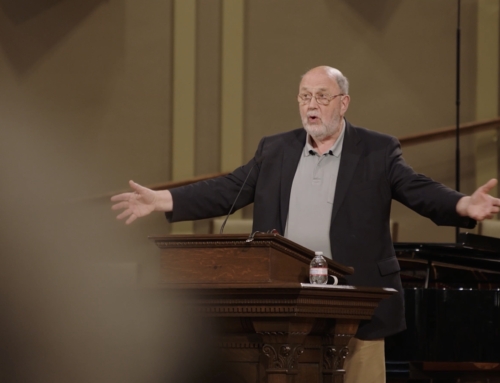Paul and his Letter to the Galatians is on sale until the end of November.
One Theory of Where Galatians Fits
Many scholars agree that Galatians was written after Paul’s first missionary journey to the churches in south Galatia. If that is so, then the situation goes like this: Paul makes that first missionary journey in Acts 13 and 14 through the cities of Iconium, Lystra, Derby and, of course, to Syrian Antioch itself. The geography and the naming of different regions is really quite tricky. This is like when in Scotland, we talk about the borders or the lowlands or whatever, and these don’t exactly fit with the different County names and regional jurisdictions in the same way.
After that, Paul is back home in Antioch, enjoying fellowship with Jews and Gentiles in Antioch. And then, Peter comes and joins in and doesn’t worry because after all, Peter has had his experience in Acts 10 and 11 in the house of Cornelius. Peter is quite happy to share fellowship with the Gentiles. Then some people come from Jerusalem supposedly sent by James. Then, Peter gets cold feet and withdraws.
Then, according to this reading, Paul hears that similar people have gone to the churches in South Galatia and have said, ‘No, actually, you’re getting it all wrong. Paul’s only given you half of the message. Yes. He’s told you about Jesus and that’s wonderful. You’ve experienced this spiritual awakening, right? But actually, you need to become part of the true family, the family of Abraham, the ancient people of God. And for that, of course, you need to get circumcised’.
That, I believe is the historical situation. This is then before the Jerusalem conference of Acts 15, and perhaps Paul, even on his way to Jerusalem to hammer this one out in public with the other Apostles, dashes off the letter to the Galatians to say, ‘Don’t do it. Don’t go there. That’s a false trail. You’ll give up everything that you’ve gained if you go that way’.
Paul’s Most Polemical Letter
Galatians is easily Paul’s most polemical letter, and as a result, it sometimes feels quite confused. He’s switching from one foot to another and from one task to another in his argument. But that I think is the historical situation.
I date Galatians very early. That is to say, in the late forties. And I put it either from Antioch itself or somewhere in that area, as Paul is preparing to go South for the Jerusalem conference.
It’s clear in Galatians that Paul has some particular opponents in mind. It’s hard to know precisely who these people are, or indeed what to call them. It used to be the case that people would refer to them as the Judaizers, but that’s a misnomer. To ‘Judaize’ in the literature of the time, doesn’t mean people who are persuading other people to become Jews. It means Gentiles who are trying to become Jews.
So if you like, the Galatians themselves are the would-be Judaizers. The opponents, who some commentators simply called the teachers or the missionaries, are Jewish Christian missionaries who have gone to the churches of Galatia to say to them, ‘Actually, in order to go the whole way, this means taking on board the whole Law, the food laws, the Sabbath, and particularly then, circumcision’.
What Motivated Paul’s Opponents?
Why were they doing this? It may simply have been, and many have advanced theories like this, that as Pharisaic Jews, which they probably were if they were taking the trouble to do this, were worried that if people were claiming to be part of, in some sense, the family of Israel, while not keeping the covenant properly, they were actually letting the side down big time.
There are many texts in which we find rabbis saying things like ‘if only all Israel would keep the law for a single day, then the age to come would dawn, the Messiah would come and it would all work out.’ It may be that they’re just thinking ‘these people are blaspheming and we’ve got to sort them out.’
There may be a more subtle reason as well, which some have recently suggested. That whole area of central and southwestern Turkey, we know from archeology, was a major center at this period of the Imperial cult. This new Roman religion worshipped the goddess Roma itself. It worshiped the Empire, the Emperor, and his family. New temples to the Emperor were springing up. Great games and festivities were organized, which would involve ritual adoration of, or allegiance to the Emperor, worshiping him as a god or whatever.
Now, interestingly, the Jews were exempt from this because the Romans had found, a century or so earlier, that the Jews are a pretty recalcitrant lot. You could try to force them to worship pagan gods, but they would cheerfully roll over and bear their necks and say, well, ‘you just have to kill us in that case.’ And they meant it. The Romans, who were pretty pragmatic about that sort of thing said, ‘Okay, okay. If it really matters that much to you, here’s the deal you Jews, you needn’t worship our gods and our Emperor, but what you must do is you must pray to your God for our state.’
How Christians Affected the Jewish Religious Status
The Jews were quite happy to do that. We will pray for you. We won’t pray to you. So that, that was the deal. Sometimes that’s summarized with the phrase, religio licita, permitted religion.
Now, this was all very well until along come these people who believe in Jesus as the Jewish Messiah and say, ‘We are the true Jews. We are the real sort of Jews now, and, therefore, we are not going to worship the Roman Emperor either’. This is big trouble because the Roman authorities are going to scratch their heads and say, ‘So now you don’t have to be a Jew; you’re claiming this permission, even though you haven’t got that ethnic badge’. This claim is big trouble for the local Jewish communities who will then put pressure on the Jewish Christians.
While this is all supposition, it works extremely well in terms of the social pressure, that we can imagine was ‘political’. There are people saying, ‘We’re going to get in trouble! Watch out! Who do those people think they are?’.
The missionaries or emissaries to Galatia are people who came, probably from Jerusalem, saying, ‘Look for goodness sake, you must get circumcised. Then you will all be bonafide, proper Jews. And then there won’t be any more trouble, will there?’.
That is the point at which Paul sees red and says, ‘No, this really won’t do’!
Latest posts by N.T. Wright (see all)
- A Preview of Prof. Wright’s Teaching on Acts - May 11, 2023
- The Music of New Creation: Holy Week Eucharist Reflections from N.T. Wright - April 14, 2022
- Hope Amid the Broken Signposts - February 17, 2021







